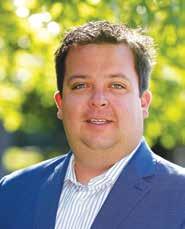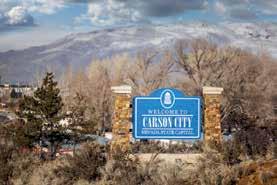




By Liz MacMenamin
AN OPPORTUNITY
to recognize the vital role pharmacists and pharmacy technicians play in keeping Nevada’s communities healthy. From providing essential medications and vaccines to offering guidance on everyday health needs, retail pharmacies are often the most accessible point of care for patients. They serve as trusted resources in both rural and urban communities, ensuring that healthcare reaches Nevadans where they live and work.
As we celebrate these contributions, it is also important to acknowledge the mounting pressures facing the retail pharmacy sector. While the conversation around pharmacy benefit manager (PBM) reform remains central, pharmacies must also contend with a host of other challenges that influence their ability to serve patients effectively. Issues such as labor shortages, technology

Liz MacMenamin
gaps, economic uncertainty, drug pricing reform, and the rising cost of specialty medications are reshaping the industry’s future.
Retail pharmacies have traditionally relied on a mix of prescription sales and front-of-store revenue from household goods, health products, and convenience items. However, the profitability of this model is being eroded by intense competition from discount retailers and online marketplaces. Large chains have reported declining
in-store sales, with categories like grocery, beauty, and health products struggling to keep pace. This trend underscores the urgent need for pharmacies to reassess their business models and focus on services that differentiate them in a crowded marketplace.
The Workforce Challenge Staffing remains one of the most pressing hurdles. Pharmacists and pharmacy technicians are expected to take on expanding responsibilities, from administering immunizations
to counseling patients on increasingly complex treatments. At the same time, declining reimbursements limit the financial flexibility operators have to raise wages. This imbalance creates significant stress in attracting and retaining skilled employees. The problem is compounded by forecasts showing that the number of pharmacy school graduates will not keep up with demand, leaving many communities vulnerable to staffing shortages in the years ahead.
Consumers today expect seamless digital experiences, and pharmacies are no exception. Online prescription refills, mobile notifications, and telehealth consultations are now considered standard offerings by many patients. Yet, smaller and
Continued from page 1
independent operators often struggle to afford the technology upgrades and cybersecurity safeguards required to meet these expectations. For many, the challenge is balancing limited resources with the need to provide a secure, modernized experience that protects patient data and builds consumer trust.
The Inflation Reduction Act introduced Medicare drug price negotiations that will take effect in 2026. While intended to lower costs for patients, the policy raises significant questions for pharmacies. Operators may be forced to purchase drugs at standard prices, bill Medicare at the negotiated rates, and then wait for rebates from manufacturers. Without clear guidelines, this system could create serious cash flow disruptions, particularly for smaller businesses already operating with thin margins. The
uncertainty surrounding these reforms highlights the need for clarity and support to ensure pharmacies remain stable through the transition.
GLP-1 drugs, widely prescribed for diabetes and increasingly for weight management, have surged in demand. Yet their high cost and inconsistent insurance coverage create access challenges for patients and financial risks for pharmacies. Specialty pharmacies have captured much of this market, leaving traditional drugstores struggling to participate fully in a segment that represents the future of pharmaceutical care.
Pharmacy Month reminds us of the indispensable role retail pharmacies play in Nevada’s healthcare system. They are more
than storefronts; they are vital community health partners. Yet they face an evolving set of challenges that threaten their ability to operate effectively and sustainably.
For pharmacies, the path forward will require innovation in business models, investments in workforce development, and adoption of secure technology. For policymakers, it is a call to ensure that reforms are designed with practical implementation in mind, so that pharmacies can continue to deliver accessible care without being undermined by financial instability. By recognizing both the achievements and the challenges of the industry, we honor not only the work of pharmacists and technicians today but also the future of retail pharmacy in Nevada and beyond.
By Mary Lau
THE RETAIL ASSOCIATION OF NEVADA CELEBRATES the remarkable life and career of Director Emeritus Ron Mestre, owner and operator of Bi-Rite Markets, proud father, and devoted grandfather. This August, we extend our warmest wishes as Ron marks his 90th birthday—a milestone befitting a true Nevada legend.
Ron Mestre is a name synonymous with service, leadership, and spirited camaraderie. Long before his distinguished business advocacy, Ron was known for his dedication to public service as a Washoe County Deputy Sheriff, often accompanied on patrol by his loyal K-9 partner, Prince. His service mindset extended to his role as a member of the Planning Commission, where he helped guide Northern Nevada’s growth and vision.
As owner of Bi-Rite
Markets, Ron built a reputation for excellence, dedication, and genuine community involvement, values that he carried into his role as a husband, father and grandfather— roles he cherishes most.
Ron’s chairmanship of the Retail Association of Nevada (RAN) marked a pivotal era for our organization and membership. Working closely with industry partners, Ron championed legislative efforts that culminated in reforms to the Nevada Revised Statutes, enabling the

Mary Lau
creation of group selfinsured associations. With persistence and vision, Ron, and Willie “Kerschner” Christensen traveled the state, meeting with business leaders to launch and grow what would become the Nevada Retail Network SelfInsured Group—a cornerstone in RAN’s protection of member interests.

But business and leadership only tell part of Ron’s story. Those fortunate enough to visit Ron and his wife Velda at their Kings River Valley Ranch know it as a place of genuine hospitality, where
friendships were forged over lively discussions and, often, a hunt on the scenic grounds—a favorite tradition shared by Ron, Velda, and the late Senator Bill Raggio. No meeting was complete without the cheerful presence of Ron’s beloved German Shorthaired Pointers or the infamous schnauzer “Cookie,” who became as much a part of the RAN family as any board member or staff.
As we honor Ron Mestre—community protector, business advocate, owner of Bi-Rite Markets, proud father and grandfather, devoted husband, and dog lover—we celebrate not just a career, but a way of life marked by humility, generosity, and lasting impact. Here’s to 90 years of wisdom, laughter, and countless stories shared.
With heartfelt appreciation, we wish Ron continued health and happiness and thank him for the indelible legacy he brings to the entire Nevada retail community.
RELY ON the Supplemental Nutrition Assistance Program (SNAP) to help put food on the table. For families across our state, SNAP is not just a federal benefit but a critical stabilizer during periods of fluctuating work hours, seasonal layoffs, or temporary economic hardship. That stability now comes with a new price tag for Nevada. Under H.R. 1, the “One Big Beautiful Bill Act,” the state must cover a much larger share of the program’s administrative costs—$19 million in the current biennium, and $25 million every year thereafter. Governor Lombardo and Nevada’s legislative leaders need to take action now to ensure our state is able to continue to fund this critical program.
Beginning October 1, 2026, states will be required to shoulder 75 percent of SNAP’s administrative costs, up from the 50 percent they have historically covered. According to Nevada’s Division of Social Services, this change alone requires $19 million in additional state funding between
By Bryan Wachter
October 2026 and June 2027. Beyond that window, Nevada must plan for $25 million in recurring annual costs. These are not estimates; they are direct obligations tied to federal law that Nevada will have to meet.
This new mandate arrives at a difficult time. As many as 130,000 Nevadans could lose benefits due to the new eligibility rules included in H.R. 1. That means fewer households receiving SNAP, even as the state assumes greater financial responsibility for administering the program. This paradox puts Nevada in the position of investing more resources into a system that will serve fewer families, underscoring the need for careful fiscal planning and strong administrative oversight.

challenges could slow or complicate benefit delivery, leaving families vulnerable during moments of need. A gap in SNAP funding could create cascading consequences, forcing parents to make impossible choices between rent, utilities, and groceries. Such instability does not simply affect individual households—it erodes confidence in public programs and
“Beginning October 1, 2026, states will be required to shoulder 75 percent of SNAP’s administrative costs, up from the 50 percent they have historically covered.”
The impact on Nevada households cannot be overstated. SNAP has long served as a safeguard against hunger for families who may otherwise face food insecurity. Without timely state action, the risk grows that administrative
leaves communities less resilient in the face of economic shifts.
That is why budgeting for SNAP’s new administrative costs cannot be delayed or treated as a secondary issue. The Legislature will undoubtedly face many
competing priorities in any special session, but this one cannot wait. Ensuring SNAP is properly funded must be on the agenda, and the $19 million needed this biennium must be set aside. Other issues can be debated later—SNAP administration funding is both urgent and unavoidable.
Nevada has always prided itself on prudent budgeting and forwardlooking planning. Meeting this new obligation requires the same approach. Lawmakers must commit to funding SNAP administration in any special session, even if other priorities are deferred. Beyond this biennium, Nevada will face $25 million in ongoing annual costs, which means the state must begin longterm planning now to prevent future shortfalls. For families, the issue is about food security and stability at home. For the state, it is about meeting legal obligations and ensuring government remains responsive and reliable. The mandate is clear: plan now, fund the program, and protect Nevada’s most vulnerable residents.
By Bryan Wachter
PHARMACY IS the most convenient and familiar place to receive vaccinations. Pharmacies have long supported flu prevention, childhood immunizations, and, most recently, the COVID-19 response. They are neighborhood institutions that people trust for timely, reliable care. This fall, however, residents seeking the updated COVID-19 booster found themselves turned away. Despite federal approval of the vaccine, community pharmacies in Nevada were not able to administer it. The issue stemmed from Nevada law. Pharmacists in the state are only authorized to administer vaccines once they have been recommended by the federal Advisory Committee on Immunization Practices. While the Food and Drug Administration had already approved the updated COVID-19 booster for adults over 65 and those with underlying health risks, the advisory committee had not yet issued its recommendation.
As a result of this gap, pharmacies were barred from offering the vaccine. Local health districts faced the same restriction and continued to rely on older vaccine stock for eligible residents.
This disconnect created widespread confusion and frustration. Families and seniors expecting quick access at their neighborhood pharmacy were instead told to wait. For businesses, the lack of convenient vaccine access raised concerns about workforce health and reliability during the upcoming fall and winter seasons, when employee absences often strain operations. The inability to get a booster shot close to home became more than an inconvenience; it highlighted how small gaps in statute can ripple outward into economic and public health concerns.
State policymakers responded quickly.
in the future. The Nevada Board of Pharmacy also stepped in and issued new guidance clarifying that pharmacists may administer FDA-approved vaccines even before the advisory committee takes final action. This step allowed community pharmacies to begin offering the updated COVID-19 booster and reassured Nevadans that they would soon have access to the same preventive care available in other states.

pharmacy services support not only public health but also the stability of Nevada’s economy. The experience of the past several weeks should serve as a reminder of how much predictability, flexibility, and ease of access matter in public health policy. Families depend on a clear path to preventive care. Businesses depend on a workforce that can remain healthy. Communities depend on pharmacies being able to serve their traditional role as the first line of defense against illness.
Legislative leaders called for an immediate review of Nevada’s law to prevent residents from being caught in a similar bind
The return of vaccine access at community pharmacies is an important development. For many residents, the local pharmacy is their primary point of contact with the healthcare system. Consistent access to vaccines in that setting helps families stay healthy, reduces the spread of preventable illness, and keeps employees on the job. In this way, reliable
The administrative fix from the Nevada Board of Pharmacy was timely and effective, but it is not the end of the conversation. The legislature will need to act at its earliest opportunity to put this solution into law. Cementing the fix will ensure that access to vaccines is not disrupted again and that Nevada families and businesses can continue to rely on their community pharmacies for the care they need—without uncertainty, confusion, or unnecessary delays .
Nevada is investigating a ransomware attack that disrupted state websites and phone lines while leaving key services like unemployment, payroll, and Medicaid intact. Hackers removed some data, but officials have not confirmed what was taken. The Governor’s Technology Office, FBI, and CISA are analyzing networks and restoring systems cautiously to ensure security. Authorities urged patience and warned that full recovery will take time, as cyberattacks against government agencies continue to rise nationwide.
Cyber Security Dive
campaigning and timing as factors, but expressed pride in their work and confidence in the caucus’s next generation.
Nevada Independent
Nevada is struggling to provide updated COVID-19 vaccines as federal guidance changes and pharmacy restrictions limit availability.
Senate Majority Leader Nicole Cannizzaro has called for swift state action, directing legislative staff to explore ways to improve access. Public health districts do not yet have the new vaccine, and CVS says it cannot administer it in Nevada until federal approval is granted. The shortage has disrupted clinics and state programs, leaving high-risk residents concerned. While other states have acted to remove barriers, Nevada’s divided leadership makes solutions uncertain, though talks of a special legislative session are underway.
Nevada Current
capacity. Officials say the deployment, scheduled through mid-November, will focus on clerical and logistical tasks rather than direct law enforcement. The move follows a broader nationwide push by Republican governors to bolster immigration enforcement, with Nevada joining states like Florida and Idaho in activating Guard units under Title 32 authority. Supporters argue the Guard’s administrative role will free ICE to focus on enforcement, while critics, including the state’s Latino Legislative Caucus, warn the deployment could harm Nevada families and communities.
Nevada Independent
Democrats rejected his proposal to convert failing schools into charters. Leaders praised the measure as one of Nevada’s most significant education compromises in recent years. Nevada Sun
Nevada’s federal public defender’s office is challenging Sigal Chattah’s authority as acting U.S. attorney, arguing her appointment violates federal law. Recent court filings seek her disqualification, the dismissal of indictments she issued, and for judges to name a new interim U.S. attorney. Chattah’s 120-day term expired in July, but the Trump administration extended her tenure through an “acting” designation, which critics say sidesteps Senate confirmation. Nevada’s Democratic senators have opposed her as partisan and unfit. Similar lawsuits in other states are raising broader scrutiny over the administration’s reliance on interim appointments.
Gov. Joe Lombardo is preparing to authorize about 35 Nevada National Guard members to assist U.S. Immigration and Customs Enforcement in a temporary, federally funded
Gov. Joe Lombardo and Democratic leaders marked the passage of Senate Bill 460, a rare bipartisan education reform that expands public prekindergarten, extends accountability ratings to districts, requires literacy training for early-grade teachers, and authorizes state action against chronically lowperforming schools. The law also incentivizes educators to work in high-need schools and makes governance changes within the Clark County School District. While Lombardo secured priorities on literacy, staff protections, and transportation,
Las Vegas Realtors report the median price of a single-family home in
Assembly Speaker Steve Yeager and Majority Leader Sandra Jauregui, both Las Vegas Democrats, will not seek re-election in 2026, ending a decade in the chamber but leaving open the possibility of pursuing other offices. Their exits, along with Speaker Pro Tempore Daniele Monroe-Moreno’s decision to run for mayor of North Las Vegas, mark a major leadership shift for Assembly Democrats. Yeager said he may consider a run for treasurer, while Jauregui has not decided on her next move. Both cited the grind of Continued on page 11
Nevada Independent
Walmart is rolling out new AI-powered “super agents” to simplify experiences for shoppers, associates, suppliers, and developers, part of a broader retail push to counter inflation and spending concerns. At its Retail Rewired event, leaders highlighted tools like Sparky, which helps customers build shopping baskets and manage reorders, and the Associate Agent, a single access point for employees. Behind the scenes, Walmart is also using digital twin technology to predict and fix store issues early, cutting emergency alerts by 30% and refrigeration costs by 19%. Together with machine learning to improve delivery accuracy, these innovations reflect Walmart’s strategy to blend customer-facing AI with operational efficiencies, signaling a major shift in how big retailers navigate a tight economy. CNBC
Target is adjusting its fulfillment strategy by limiting which stores handle online orders, aiming to balance e-commerce efficiency with in-store shopping. Following a test in Chicago, COO and incoming CEO Michael
Fiddelke said stores built for fulfillment—with larger backrooms and moderate foot traffic—will continue packing online orders, while others will focus on driveup, pickup, and in-store experiences. The approach will expand to 30–40 markets this year. With more than 96% of sales fulfilled through stores, Target is seeking a sharper omnichannel model as it faces sales declines and prepares for Fiddelke to replace outgoing CEO Brian Cornell in 2026.
Supply Chain Dive
Walmart reported a 50% jump in U.S. store-fulfilled delivery sales, crediting faster shipping speeds for driving repeat customer orders and market share gains. The retailer plans to offer dynamic delivery windows to 95% of U.S. households by year’s end, using AI and realtime data to improve route accuracy and delivery times. Walmart already reaches 93% of the country within three hours and is extending rapid delivery to third-party sellers through Walmart Fulfillment Services, now providing next-day coverage in major cities like Los Angeles, New York, and Chicago.
Supply Chain Dive
Best Buy has partnered with Uber Eats to offer same-day and scheduled delivery of electronics, expanding its reach into the on-demand economy alongside companies like Home Depot and Dollar General. The move follows Best Buy’s August launch of a third-party marketplace that doubled its product assortment, adding new categories from appliances to furniture. The retailer reported Q2 revenue of $9.4 billion, up 1.6% year over year, with growth driven by computing, gaming, and mobile phones. CEO Corie Barry said Best Buy is working to offset tariff impacts while maintaining its full-year guidance.
Retail Dive
Walmart is broadening its 10% employee grocery discount to cover 95% of regularly priced instore items, a move aimed at improving retention and responding to worker feedback for more meaningful perks. Associates receive the discount card after 90 days of employment, and leaders said the change was one of the most requested benefits. The expansion
brings Walmart closer to competitors like Kroger and Target, though still below Trader Joe’s and Whole Foods, which offer 20% discounts. The move follows other efforts to enhance employee benefits, including technician training programs, AIpowered hiring tools, and veteran-focused career support.
Grocery Dive
Lowe’s is crediting its associate-facing app, Mylow Companion, with boosting customer satisfaction by helping employees provide more knowledgeable, cross-department support. The tool, built on the same technology as the Mylow app, enables workers to answer project questions on the spot, driving “significant” improvements in customer ratings. The retailer is also enhancing its pro customer offerings through its planned acquisition of Foundation Building Materials, whose MyFBM app provides realtime pricing, inventory, and delivery insights. Lowe’s reported 1.1% comparable sales growth in Q2 2025, with digital sales up 7.5% on stronger online experiences and rewards program engagement.
By Liz MacMenamin
THE
NEVADA BOARD OF Pharmacy meeting on September 4th, 2025, the board presented a rule for a workshop that would impose impractical staffing levels in a Nevada community pharmacy. This rule would set rigid staffing requirements that are unrealistic in Nevada given the availability of professionals in the pharmacy workforce.
Across the country, communities are experiencing a shortage of healthcare workers, and Nevada is no exception. Pharmacy school graduates and new students continue to decline in all states, and this is true at Roseman University of Health Sciences, the only school of pharmacy in Nevada.
number of pharmacy technicians declined in the first quarter of 2025. This shortage is occurring during a time of increasing demand for pharmacy services in our communities. The public has become increasingly reliant on healthcare services provided by their pharmacy, such as immunizations, testing, contraceptive care, and other clinical services. Imposing arbitrary staffing minimums, as this regulation would do, undermines pharmacies’ ability to leverage the available workforce to continue providing
based on its setting, patient volume, and available resources. This regulation does not take these factors into consideration and will be challenging, if not impossible, given these variabilities, for all pharmacies to follow a universal cookie-cutter formula.
Many Nevadans rely on specialized, critical services for vulnerable populations – including individuals with mental and behavioral health problems. These services play an important role in our state, and this regulation would impose
“Across the country, communities are experiencing a shortage of healthcare workers, and Nevada is no exception.”
these essential services.
The National Center for Workforce Analysis (NCHWA) has projected that this shortage will only deepen in the next 15 years. They have also determined that the
It is also likely that pharmacies in rural and lower socioeconomic areas will be forced to close their doors due to the inability to meet the requirements of this regulation in Nevada. Other areas may face reduced operating hours.
Every pharmacy operates differently
staffing ratios that are not feasible and would significantly reduce services for patients already facing substantial barriers to care.
Community pharmacies and the pharmacists who work in them are mindful of patients’ needs and are committed to providing safe, continued access to healthcare, but this
regulation is not the answer. Nevada would be the only state to address this issue in this way, and we continue to oppose this approach. We have been willing to work with the board to address the issue and hope it considers that there was no support from pharmacies or pharmacists who testified at the workshop. The only supporting testimony came from an instructor at Roseman University, someone not working directly with patients on a daily basis. This regulation will be discussed again at the workshop during the next board meeting in Las Vegas, and we encourage pharmacies, pharmacists, and patients to reach out to the Board of Pharmacy, the governor’s office, and their legislators to voice concerns about possible future reductions in access to these healthcare services. You may also reach out to me if you have any questions or concerns you would like addressed.
RAN Staff Report
the new Nevada Assembly Democratic leadership team on their election to the caucus Executive Board. We especially commend Chair Elaine Marzola on her successful bid to lead the caucus into the next legislative session. Chair Marzola and her colleagues have demonstrated a willingness to engage on business issues, and we look forward to continuing to grow a business-friendly
majority in the Nevada Legislature.
Nevada stands at a crossroads on critical issues that will shape the future for businesses and consumers across our state. Working together, we must address the rise in retail crime, protect access to benefits such as SNAP that ensure Nevadans can meet their basic needs, and carefully evaluate proposals before the Legislature that could impact consumer prices and business operations.
RAN is eager to collaborate with Assembly

leadership and members of both chambers to develop solutions that support a strong economy and healthy communities.
We also look ahead to the upcoming election cycle, when we will welcome new candidates into the conversation and share the priorities that matter most to Nevada’s retailers and the customers they serve.
The Retail Association of Nevada is committed to building constructive partnerships and advancing policies that strengthen Nevada’s business climate while protecting the interests of our state’s consumers.
SPARKS RETAIL THEFT OPERATION LEADS TO ARRESTS
A joint retail theft operation involving the Sparks Police Department, Walmart, and Kohl’s resulted in three arrests and six citations. Offenses included petit larceny, resisting arrest, possession of a controlled substance, and multiple warrants. Officers also recovered more than $1,000 in
stolen merchandise during the effort.
2 News Reno
LVMPD SEEKS SUSPECT IN $5K GRAND
LARCENY CASE
Las Vegas police are searching for a man accused of stealing more than $5,000 in merchandise from a specialty store near Lake Mead Boulevard and Buffalo Drive on May 19. The suspect is described
as a white male, 40 to 50 years old, about 6 feet tall and 220 pounds, with a beard, seen wearing a baseball hat, longsleeve shirt, sunglasses, black shorts, and shoes. Authorities urge anyone with information to contact LVMPD’s Retail Theft Section or Crime Stoppers, where tips leading to an arrest may qualify for a cash reward.
Fox 5 Las Vegas
$15M IN APPLE PRODUCTS, SEMICONDUCTORS STOLEN FROM RENO SEMI-TRAILER
Reno police are investigating the July 3 theft of a Ceva Logistics semi-trailer loaded with Apple products and AMD semiconductors worth an estimated $15 million. Thieves used a tractor to drive off with the trailer from Sierra Airfreight
NRS requires all existing members of a self-insured group to be notified of all new members. NRNSIG new members are listed below.
NRNSIG members who wish to register a negative vote on a new group member, please write NRNSIG at 575 S. Saliman Road, Carson City, NV 89701, indicating which member and the reason(s) for the negative vote.


Membership Information: Find out more about RAN’s self insured group. Call Pro Group, 800-859-3177, or the RAN office at 775-882-1700 (toll free in Nevada 800-690-5959). Don’t forget to check out our website, www.RANNV.org.
Express’s unsecured lot after hours; it was later found empty in Madera, California. The case highlights concerns over security practices for high-value shipments as cargo theft surges nationwide, with losses topping $1 billion in 2023 and projected to rise another 22% in 2025. Electronics remain the most targeted goods,
Continued from page 9
often stolen through full truckload heists.
Freight Waves
California authorities have arrested 14 people accused of operating the largest organized retail theft ring ever targeting Home Depot,
July hit $485,000, tying the all-time high set in June and up 1% from last year. Condo and townhome prices fell slightly to $290,000, while housing inventory jumped more than 50%, signaling a potential cooling market. Still, affordability remains a pressing challenge: nearly 79% of Nevada households cannot afford a medianpriced home, with ownership rates ranking 48th in the nation. Analysts note it now takes nearly two decades for Nevadans to save for a home, driving the average age of first-time buyers to 38. State lawmakers have passed measures to boost affordable housing, including new transparency rules for rental contracts, casita ordinances, expanded apartment zoning, and $180 million in funding to make homes more attainable for working families.
KTNV Las Vegas
with nine facing felony charges. Prosecutors say ringleader David Ahl and his accomplices carried out more than 600 thefts across 71 stores, stealing over $10 million in merchandise, mainly electrical components. Stolen goods were funneled through Ahl’s Tarzana storefront, family members, and online resale operations.
Investigators seized $3.7 million in Home Depot property and $800,000 in laundered cash. Officials stressed the case highlights how organized retail crime threatens not just retailers’ bottom lines but also customer and employee safety.
ABC News
Continued from page 6
Las Vegas tourism officials are working to regain Canadian visitors after political tensions and shifting travel habits caused sharp declines from the city’s largest international market. LVCVA CEO Steve Hill traveled to Vancouver to meet with Canadian partners, acknowledging some travelers may not return soon but stressing the city is “ready when you’re ready.” Canadian airline traffic to Las Vegas is down 18 percent in 2025, potentially costing 280,000 visitors. To counter the drop, Caesars and other resorts launched incentive packages, while the LVCVA is working with WestJet and Air Canada on deals. Hill also hinted at a campaign to address high costs and resort fees, aiming to reverse an 8 percent year-overyear visitation decline.
Nevada Independent
Gov. Joe Lombardo has asked Interior Secretary Doug Burgum to clarify and reverse a federal memo that he says has stalled solar development across Nevada. The directive, which requires the secretary’s review of all solar and wind projects on public lands, has delayed approvals not only on federal property but also on private projects needing federal transmission rights. Lombardo warned the freeze is jeopardizing major NV Energy projects, including Boulder Solar III, Dry Lake East, and Libra, and could hinder the state’s ability to meet rising energy demands from industries like mining and data centers.
Solar Powered World
Princeton University’s Gerrymandering Project has given Nevada an “F” for partisan gerrymandering, placing it alongside Texas despite their political differences. The 2021 maps, drawn by Democratic majorities and signed by then-Gov. Steve Sisolak, strengthened Democrats’ hold on Congress and the Legislature by making all four House districts noncompetitive and shoring up key legislative seats. While critics argue the maps disenfranchise Republicans, Democratic strategists counter that population growth in Clark County drove most of the changes. With Democrats now close to supermajorities, efforts to establish an independent redistricting commission are expected to resurface in 2026, as concerns grow over voter turnout, competitiveness, and representation. LVRJ
Mary F. Lau CEO
Bryan Wachter President
Elizabeth MacMenamin Vice President of Government Affairs
Piper Brown Vice President, Finance and Administration
Megan Bedera Editor
Sue Arzillo, Alphabet Soup. Newsletter Design & Layout










